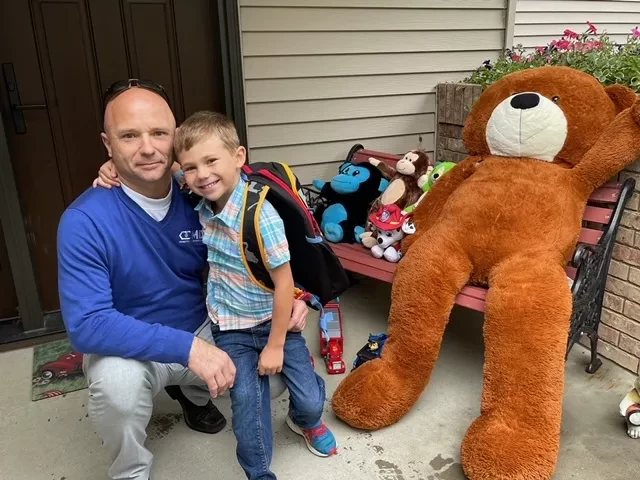‘Two lives’ of sobriety: Brad’s addiction recovery story

Published Dec. 11, 2021
Brad’s recovery from addiction has shown him the rewards of simplicity.
“I’ve learned that I really enjoy being boring,” he said, laughing. “I don’t have any longing for using. My days are fun now when I get to spend time with my son, go fishing, play baseball and go to bed early. Younger me would’ve hated that.”
Brad lives in Bismarck, ND with his family and works as a business development analyst. He’s had “two lives” of sobriety.
“There’s a whole world out there (beyond addiction),” he said. “Sobriety is fun and rewarding.”
One
Originally from the small town of New Salem, ND, Brad lived all over the country while he was in the Army and the construction field. He moved back to his home state in 2006 to be closer to family.
“I lived in 12 different states and I really enjoyed it – I like to see different people and cultures,” he said. “I also enjoy being up here (in North Dakota). It’s home.”
Brad’s unhealthy relationship with alcohol lasted about 20 years. Shortly after moving to Bismarck, something clicked. He had just been charged with two DUIs within three days – bringing his total to six – and he realized alcohol was the anchor holding him back.
“I had this realization that my life would keep floundering and probably end if I didn’t change,” he said.
After completing Drug Court, Brad graduated college with a finance degree, found a job he’s still in today, got married and had a daughter.
“I accomplished more in that six years and I did in the first 33 by far,” he said.
Before she was born, Brad and his wife discovered their daughter had a heart defect. She had multiple open-heart surgeries and spent a lot of time in hospitals throughout the Midwest.
Their daughter died in 2014, at only 2 years old. Their son was born a few months afterward.
“It was a horrendous time,” Brad said. “I’m a doer; I want to fix things. It was the worst feeling in the world.”
Since their loss, Brad and his wife have started a nonprofit to help provide support and resources to parents with sick children.
“That’ll be our therapy, in a way, to keep her memory alive,” he said.
Two
Brad started drinking to cope with his loss in 2014.
“While my daughter was sick my sobriety took a back seat. It was the start of my relapse,” he said. “I got resentful toward God, which is something I wrestled for many years.”
Shortly after Brad started drinking again, he was introduced to meth.
“That’s what I battled with these last six years,” he said. “I spent years fighting this and not being able to control it; it really opened my eyes.”
Brad’s recovery from meth was a completely different experience.
“My first recovery was so easy. I kind of had the attitude, ‘If I did it, you can do it,’” he said. “(But after meth), I was a mess. Now I have more compassion for people going through that.”
His turning point came on a stiflingly hot day in Minnesota while he was enrolled in an inpatient treatment center.
“It was so hot and humid that day, they were telling us not to go outside. I was out jogging in the woods, they have six miles of running trails in a beautiful forest, and I thought to myself, ‘Wow, I could pass out here,’ and I laughed since that’s exactly what they had warned us about,” he said. “I stopped and that’s when it hit me – this is my free will. We’re not puppets on a string for God. It sounds basic, but it was life-changing for me. We have free will and some of the things we do have consequences. God didn’t cause disease, we did. All of my anger with God was suddenly gone. I’ll never forget that moment.”
Before leaving treatment, Brad wanted to have a wellness team in place. Face It TOGETHER is one of several components he incorporated.
“When I was looking for help, and I looked high and low, I didn’t see anything close to this (approach). It’s going to remain part of my recovery team that I have in place,” he said. “It’s helping me move forward and upward.”
Over the years, Brad has tried about 10 different kinds of treatment. He appreciates the non-clinical approach and mutual respect of peer coaching.
“It’s something I hadn’t seen before, and I’ve tried about everything. Sadly, it’s different from everything I’ve experienced,” he said. “Someone actually listening and working with you to draft a plan – it shouldn’t be earth-shattering, but it is.”
Brad always leaves his coaching sessions feeling glad he went. Eventually, he’d like to visit Sioux Falls so he can meet his coach, Kattie, in person.
“I’d like to meet her face-to-face. Over the phone is still great, we have great conversations,” he said. “It’s like talking to a friend or mentor.”
Today
Now in his “second life” of sobriety, Brad has seen a drastic improvement in all areas of his life.
“I can’t even begin to describe them all,” he said. “I love sobriety. I love having a life and being able to accomplish things.”
Though Brad always maintained a job and spent time with his family every night while struggling with addiction, he wasn’t present.
“I know when I’m not doing my best. I spent all those years in neutral, not really getting anywhere,” he said. “There’s so much more out there. Once you get some true recovery, you can start living.”
